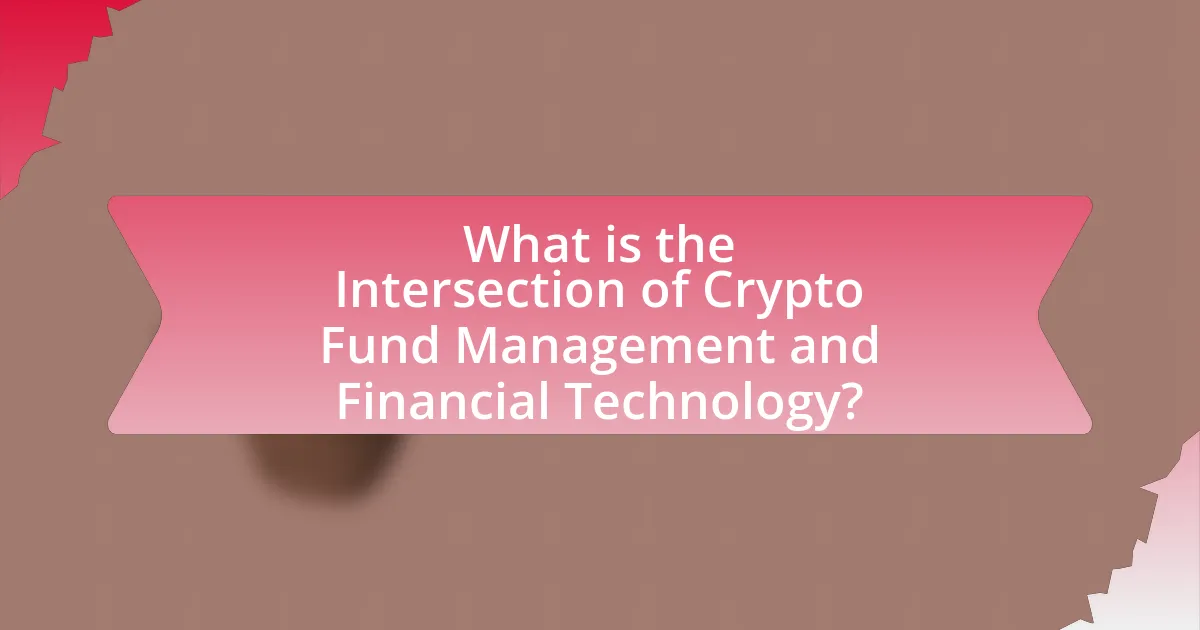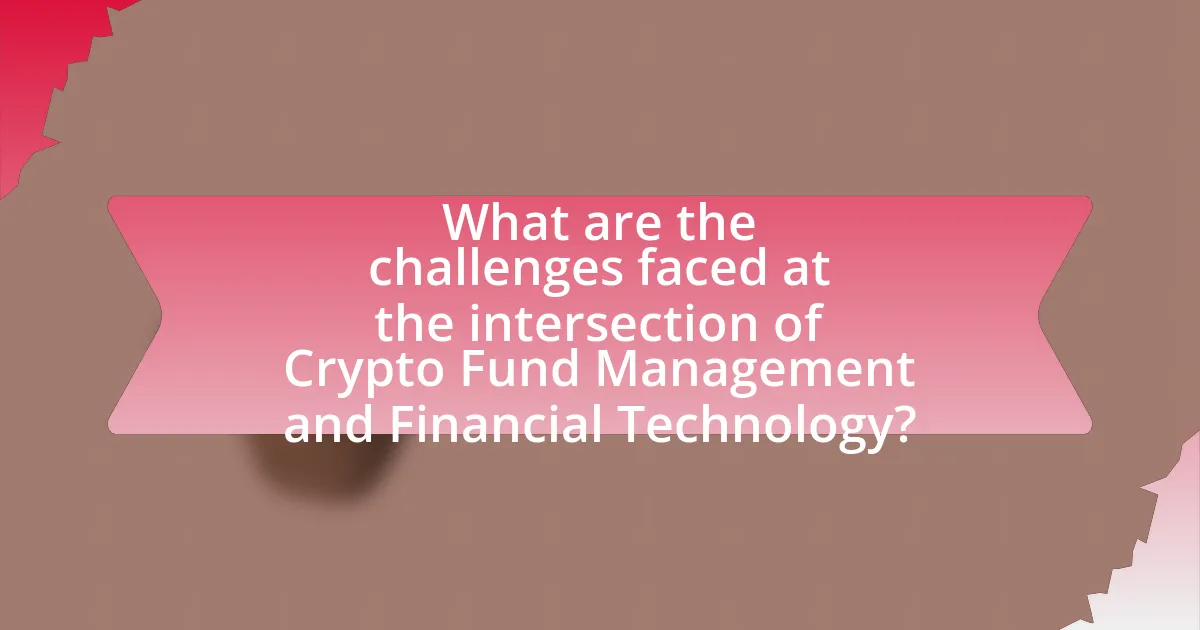The article examines the intersection of crypto fund management and financial technology, highlighting how blockchain technology and digital assets are integrated into traditional investment strategies. It discusses the role of financial technology tools in enhancing portfolio management, risk assessment, and transaction efficiency, as well as the key components of crypto fund management, including asset selection and compliance. The article also addresses the challenges faced in this space, such as regulatory uncertainty and security risks, while exploring future trends and innovations that could reshape the landscape. Additionally, it emphasizes the importance of transparency and robust risk management practices for building investor trust in the evolving crypto fund management sector.

What is the Intersection of Crypto Fund Management and Financial Technology?
The intersection of crypto fund management and financial technology lies in the integration of blockchain technology and digital assets into traditional investment strategies. Crypto fund management utilizes financial technology tools to enhance portfolio management, risk assessment, and transaction efficiency. For instance, platforms like Coinbase and Binance provide advanced trading algorithms and analytics that enable fund managers to optimize their investment decisions in cryptocurrencies. Additionally, the use of smart contracts on blockchain networks automates processes such as compliance and reporting, reducing operational costs and increasing transparency. This synergy between crypto fund management and financial technology is evidenced by the rapid growth of crypto hedge funds, which have seen a significant increase in assets under management, reaching over $3 billion in 2021, according to data from Hedge Fund Research.
How do Crypto Fund Management and Financial Technology interact?
Crypto fund management and financial technology interact by leveraging advanced technological solutions to enhance investment strategies and operational efficiencies in cryptocurrency assets. Financial technology provides tools such as blockchain for secure transactions, algorithms for automated trading, and data analytics for market insights, which are essential for managing crypto funds effectively. For instance, the integration of smart contracts allows for automated compliance and transaction execution, reducing operational risks and costs. Additionally, platforms like Coinbase and Binance utilize financial technology to offer user-friendly interfaces and robust security measures, facilitating easier access to crypto investments for fund managers and their clients. This synergy between crypto fund management and financial technology ultimately drives innovation and growth in the digital asset space.
What are the key components of Crypto Fund Management?
The key components of Crypto Fund Management include asset selection, risk management, compliance, and performance tracking. Asset selection involves identifying and investing in cryptocurrencies and blockchain projects that align with the fund’s strategy. Risk management focuses on mitigating potential losses through diversification and hedging strategies. Compliance ensures adherence to regulatory requirements, which is crucial given the evolving legal landscape surrounding cryptocurrencies. Performance tracking involves monitoring the fund’s returns and adjusting strategies based on market conditions and investment performance. These components are essential for effective management and growth of crypto funds in the financial technology sector.
How does Financial Technology enhance Crypto Fund Management?
Financial Technology enhances Crypto Fund Management by providing advanced tools for automation, data analysis, and risk management. These technologies enable fund managers to execute trades more efficiently, analyze market trends in real-time, and manage portfolios with greater precision. For instance, algorithmic trading platforms can process vast amounts of data to identify profitable trading opportunities, while blockchain technology ensures transparency and security in transactions. Additionally, the integration of artificial intelligence allows for predictive analytics, helping managers make informed decisions based on historical data and market behavior. This combination of efficiency, accuracy, and security significantly improves the overall performance and reliability of crypto fund management.
Why is the intersection of these fields significant?
The intersection of crypto fund management and financial technology is significant because it enhances investment efficiency and accessibility. This convergence allows for the integration of blockchain technology, which provides transparency and security in transactions, thereby reducing fraud and operational risks. Additionally, financial technology innovations, such as automated trading algorithms and data analytics, enable fund managers to make informed decisions quickly, optimizing portfolio performance. According to a report by Deloitte, the global blockchain market in financial services is projected to reach $22.5 billion by 2026, underscoring the growing importance of this intersection in shaping the future of finance.
What trends are shaping the future of Crypto Fund Management?
The future of Crypto Fund Management is being shaped by trends such as increased regulatory scrutiny, the rise of decentralized finance (DeFi), and the integration of artificial intelligence (AI) for investment strategies. Regulatory scrutiny is intensifying as governments worldwide seek to establish frameworks that ensure investor protection and market integrity, which is evidenced by the introduction of regulations in jurisdictions like the European Union and the United States. The rise of DeFi platforms is transforming traditional fund management by enabling peer-to-peer transactions and automated investment processes, as seen in the growth of platforms like Uniswap and Aave. Additionally, the integration of AI in investment strategies is enhancing decision-making processes, with firms leveraging machine learning algorithms to analyze market data and optimize portfolio management, a trend supported by research from firms like Deloitte, which highlights the increasing adoption of AI in financial services.
How does this intersection impact investors and fund managers?
The intersection of crypto fund management and financial technology significantly impacts investors and fund managers by enhancing operational efficiency and expanding investment opportunities. This integration allows fund managers to leverage advanced technologies such as blockchain for transparent transactions and real-time data analytics, which improves decision-making processes. For instance, a report by Deloitte highlights that blockchain can reduce transaction costs by up to 30%, directly benefiting investors through lower fees and faster execution times. Additionally, the rise of decentralized finance (DeFi) platforms provides fund managers with innovative financial products, enabling them to diversify portfolios and access new markets, which can lead to higher returns for investors.

What are the challenges faced at the intersection of Crypto Fund Management and Financial Technology?
The challenges faced at the intersection of Crypto Fund Management and Financial Technology include regulatory uncertainty, security risks, and market volatility. Regulatory uncertainty arises because many jurisdictions have not established clear guidelines for cryptocurrency investments, leading to compliance difficulties for fund managers. Security risks are significant, as the digital nature of cryptocurrencies makes them susceptible to hacking and fraud, which can jeopardize investor assets. Market volatility is another challenge, as the prices of cryptocurrencies can fluctuate dramatically, impacting fund performance and investor confidence. These challenges necessitate robust risk management strategies and adaptive regulatory frameworks to ensure the stability and growth of crypto fund management within the financial technology landscape.
What regulatory hurdles exist in this space?
Regulatory hurdles in the intersection of crypto fund management and financial technology include compliance with anti-money laundering (AML) and know your customer (KYC) regulations, which require extensive verification processes for investors. Additionally, the lack of a unified regulatory framework across jurisdictions complicates operations, as firms must navigate varying laws and regulations, such as the SEC’s classification of cryptocurrencies as securities in the United States. Furthermore, the Financial Action Task Force (FATF) guidelines impose obligations on crypto service providers to report suspicious activities, adding another layer of compliance. These challenges can hinder innovation and increase operational costs for firms operating in this space.
How do regulations differ across regions for Crypto Fund Management?
Regulations for Crypto Fund Management vary significantly across regions, primarily influenced by local legal frameworks and financial market maturity. In the United States, the Securities and Exchange Commission (SEC) classifies many cryptocurrencies as securities, requiring compliance with stringent regulations, while in Europe, the Markets in Crypto-Assets (MiCA) regulation aims to create a unified regulatory framework across EU member states, focusing on consumer protection and market integrity. In contrast, regions like Asia exhibit diverse approaches; for instance, Singapore has established a progressive regulatory environment under the Payment Services Act, promoting innovation while ensuring regulatory oversight. These differences reflect varying levels of regulatory acceptance and risk tolerance, impacting how crypto funds operate globally.
What compliance issues arise with Financial Technology in crypto?
Compliance issues that arise with Financial Technology in crypto include regulatory uncertainty, anti-money laundering (AML) requirements, and consumer protection concerns. Regulatory uncertainty stems from the evolving nature of cryptocurrency laws, which can vary significantly across jurisdictions, leading to challenges in compliance for fintech companies. AML requirements necessitate robust Know Your Customer (KYC) processes to prevent illicit activities, as failure to comply can result in severe penalties. Additionally, consumer protection concerns arise from the lack of established frameworks to safeguard users against fraud and market volatility, which can undermine trust in crypto financial services. These compliance challenges highlight the need for fintech firms to navigate a complex regulatory landscape while ensuring adherence to legal standards.
What technological challenges are present?
Technological challenges in the intersection of crypto fund management and financial technology include scalability, security, regulatory compliance, and interoperability. Scalability issues arise as blockchain networks struggle to handle increasing transaction volumes efficiently, impacting performance. Security challenges are significant, as the decentralized nature of cryptocurrencies makes them susceptible to hacking and fraud; for instance, in 2021, over $3 billion was lost to crypto hacks. Regulatory compliance poses difficulties due to varying global regulations, which can hinder operations and create legal risks for fund managers. Lastly, interoperability between different blockchain platforms remains a challenge, as many systems do not communicate effectively, limiting the seamless transfer of assets and data.
How do security concerns affect Crypto Fund Management?
Security concerns significantly impact Crypto Fund Management by necessitating robust risk management strategies and compliance measures. The decentralized and often anonymous nature of cryptocurrencies makes them susceptible to hacking, fraud, and regulatory scrutiny. For instance, in 2021, the cryptocurrency sector experienced over $14 billion in hacks, highlighting the urgent need for enhanced security protocols. Consequently, fund managers must invest in advanced cybersecurity technologies, conduct regular audits, and implement strict compliance frameworks to protect assets and maintain investor trust. This focus on security not only safeguards funds but also aligns with regulatory requirements, ensuring long-term viability in the evolving financial landscape.
What are the limitations of current Financial Technology solutions?
Current Financial Technology solutions face several limitations, including regulatory challenges, security vulnerabilities, and integration issues. Regulatory challenges arise from the rapidly evolving legal landscape, which can hinder innovation and create compliance burdens for fintech companies. Security vulnerabilities are a significant concern, as high-profile data breaches and cyberattacks have exposed sensitive financial information, undermining user trust. Integration issues occur when fintech solutions struggle to seamlessly connect with traditional banking systems or legacy infrastructure, leading to inefficiencies and user frustration. These limitations highlight the need for ongoing improvements in regulatory frameworks, security protocols, and interoperability among financial systems.

What are the future prospects for the intersection of Crypto Fund Management and Financial Technology?
The future prospects for the intersection of Crypto Fund Management and Financial Technology are highly promising, driven by increasing institutional adoption and regulatory advancements. As of 2023, the global cryptocurrency market capitalization exceeds $1 trillion, indicating significant investor interest. Financial technology innovations, such as blockchain integration and automated trading systems, enhance operational efficiency and transparency in crypto fund management. Furthermore, regulatory frameworks are evolving, with countries like the United States and the European Union implementing clearer guidelines, which can foster greater trust and participation from traditional investors. This convergence is expected to lead to the development of more sophisticated investment products and services, ultimately expanding the market and attracting a broader range of investors.
How might innovations in Financial Technology influence Crypto Fund Management?
Innovations in Financial Technology significantly enhance Crypto Fund Management by improving efficiency, transparency, and accessibility. For instance, advancements in blockchain technology facilitate real-time transaction processing and auditing, which reduces operational risks and enhances trust among investors. Additionally, the integration of artificial intelligence and machine learning in financial analytics allows fund managers to make data-driven investment decisions, optimizing portfolio performance. According to a report by Deloitte, 76% of financial services executives believe that blockchain will disrupt their industry, indicating a strong trend towards adopting these technologies in fund management.
What emerging technologies could reshape this intersection?
Emerging technologies such as blockchain, artificial intelligence, and decentralized finance (DeFi) could reshape the intersection of crypto fund management and financial technology. Blockchain technology enhances transparency and security in transactions, which is crucial for fund management. Artificial intelligence can optimize investment strategies by analyzing vast amounts of data to predict market trends, thereby improving decision-making processes. Decentralized finance introduces innovative financial products and services that operate without traditional intermediaries, allowing for greater accessibility and efficiency in fund management. These technologies collectively drive innovation, reduce costs, and enhance the overall effectiveness of financial operations in the crypto space.
How can fund managers leverage Financial Technology for better performance?
Fund managers can leverage Financial Technology to enhance performance by utilizing advanced data analytics, algorithmic trading, and automated portfolio management tools. These technologies enable fund managers to analyze vast amounts of market data in real-time, identify trends, and make informed investment decisions quickly. For instance, a study by Deloitte found that firms using data analytics can improve their investment decision-making process by up to 30%. Additionally, algorithmic trading allows for executing trades at optimal prices, reducing transaction costs and increasing returns. Automated portfolio management systems can also optimize asset allocation and risk management, leading to improved overall fund performance.
What best practices should be adopted in this evolving landscape?
Adopting best practices in the evolving landscape of crypto fund management and financial technology involves implementing robust risk management strategies, ensuring regulatory compliance, and leveraging advanced technology for transparency and efficiency. Risk management is critical as the volatility of cryptocurrencies can significantly impact fund performance; therefore, employing diversified investment strategies and real-time monitoring tools can mitigate potential losses. Regulatory compliance is essential to navigate the complex legal frameworks surrounding cryptocurrencies, which can vary by jurisdiction; staying informed about regulations such as the Financial Action Task Force guidelines can help funds operate within legal boundaries. Additionally, utilizing blockchain technology enhances transparency and security in transactions, fostering trust among investors. These practices are supported by industry reports indicating that funds adopting comprehensive risk management and compliance frameworks tend to outperform their peers in volatile markets.
How can fund managers ensure compliance while adopting new technologies?
Fund managers can ensure compliance while adopting new technologies by implementing robust regulatory frameworks and conducting thorough due diligence on technology providers. This involves regularly assessing the compliance capabilities of new technologies against existing regulations, such as the SEC guidelines for investment advisors and the AML/KYC requirements. For instance, a study by Deloitte highlights that 86% of financial institutions prioritize compliance when integrating new technologies, indicating the importance of aligning tech adoption with regulatory standards. Additionally, continuous training for staff on compliance issues related to new technologies further strengthens adherence to regulations.
What strategies can enhance investor trust in Crypto Fund Management?
Transparent communication enhances investor trust in Crypto Fund Management. By providing clear, consistent updates on fund performance, investment strategies, and market conditions, fund managers can build credibility. Additionally, implementing robust security measures, such as multi-signature wallets and regular audits by reputable third parties, further assures investors of the safety of their assets. According to a 2021 survey by PwC, 78% of investors indicated that transparency in operations significantly influences their trust in fund managers. This data underscores the importance of transparency and security in fostering investor confidence in the crypto space.















